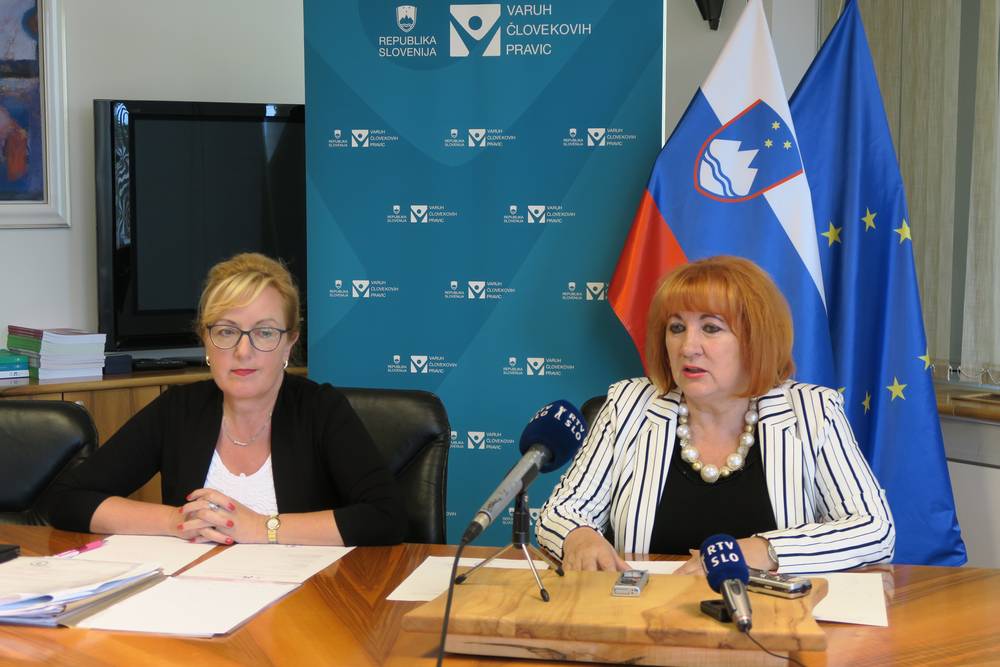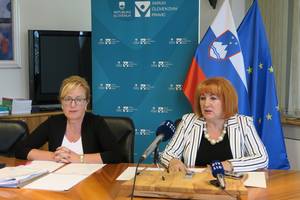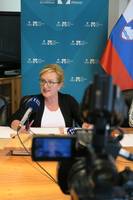On Wednesday, 28 June 2018, at a press conference on the day after the first meeting of the Council of the Human Rights Ombudsman (Council), Human Rights Ombudsman Vlasta Nussdorfer and the Chairperson of the Council of the Ombudsman Dr. Kornelija Marzel, Deputy Ombudsman, presented the Council's tasks, orientations and composition and contribution to the functioning of the Ombudsman of the Republic of Slovenia (Ombudsman).
The Ombudsman first presented the long-standing efforts of all ombudsmen to establish a National Human Rights Institution (DIČP in Slovenian or NHRI in the Anglo-Saxon world). The Ombudsman has warned for many years, also with recommendations in annual reports and consultations, that there is no institution in Slovenia operating on the basis of the Paris Principles adopted by such institutions and approved by the bodies of the United Nations Organisation, including the General Assembly. The General Assembly adopted these principles with United Nations General Assembly resolution 48/134 of 20 December 1993, emphasised the Ombudsman. She added that the Ombudsman would appropriately mark the 25th anniversary of the adoption of the Paris Principles at the end of the year.
Recommendations for transforming the Ombudsman institution into NHRI were also made by several countries within the framework of the second round of the consideration of Slovenia under the Universal Periodic Review of Countries (UPR). This issue has been on the agenda several times of the Inter-ministerial Working Group for Human Rights within the framework of the Ministry of Foreign Affairs. At the meetings of the Group, the Ombudsman expressed readiness to assume full membership of a national institution for human rights with A status according to the Paris Principles on the condition that suitable staff and material are made available to enable such duties to be fulfilled. In these discussions, the Ombudsman proposed that the most rational solution for Slovenia would be to reorganise the Ombudsman institution into a national institution as per the Paris Principles according to the Finnish example.
The National Assembly has repeatedly approved the Ombudsman's recommendations on the need to ensure the conditions for the functioning of a national human rights institution, but no progress was made in their implementation until December 2017, when the National Assembly of the Republic of Slovenia adopted the Act Amending the Human Rights Ombudsman Act.
With these legislative amendments, the Ombudsman received wider authorisations and tasks, and in particular, the legal basis for the functioning of the Human Rights Centre and the Council of the Ombudsman. On this legal basis, the ten-year project of child advocacy finally became an independent organisational unit of the Ombudsman, said the Ombudsman. The law stipulates that individual organisational units are led by deputies; therefore, the Ombudsman authorised her deputy, Dr. Kornelija Marzel, to lead the Council.
The Ombudsman expressed her satisfaction that the transition to the NHRI occurred in the year when Slovenia is holding the Presidency of the United Nations (UN) Human Rights Council, the leading international body in the field of human rights.
The Ombudsman has already been performing many of the tasks performed also by the NHRI, but for acquiring A status under the Paris Principles, this did not satisfy the condition of plurality of composition and did not have the appropriate financial and material resources to perform these tasks. The establishment of the Council as the consulting body of the Ombudsman ensures the guarantees for pluralistic representation of social forces (civil society) involved in protecting and promotiing human rights. Also, the Ombudsman has received adequate funds for the work of the Council and the Centre, which will start to operate on 1 January 2019 in accordance with the amended Ombudsman Act. Year after year, the institution of the Ombudsman has encountered interference with its financial independence, the Ombudsman said, warning again of the problems which she also outlined in the annual report for 2017 (page 68).
The Ombudsman hopes that now that all conditions have been met, there will be no obstacles to changing B status into A according to the Paris Principles. According to the Ombudsman, she is expecting to apply for a status change in autumn. As a status B country, we are currently classified among those countries that are not exemplary regarding the level of respect for human rights, she said. She also emphasised that as many as 77 national institutions have A status, while 33 (including the Ombudsman) have B status. Ten institutions that do not meet the minimum requirements under the Paris Principles have status C.
Status A will significantly contribute to Slovenia's reputation with respect to international connections and mechanisms in the field of human rights, added the Chairperson of the Council, Dr. Kornelija Marzel. In its basic principles, the Ombudsman remains an individually managed body for dealing with initiatives, and the latest legal amendment allows certain segments of society to influence Ombudsman's work, she emphasises. The Chairperson of the Council estimates that the Council, as one of four internal organisational units of the Ombudsman, will be a kind of formalised form of cooperation with representatives of society, with which the Ombudsman already cooperates well, while the views and opinions of the members on current human rights issues will increase the value of the work of the institution.
The Deputy outlined some other Council tasks, including:
- accepting the findings about the level of observance of human rights and fundamental freedoms and about legal certainty in the Republic of Slovenia;
- giving views on the annual and special reports of the Ombudsman;
- forming proposals to the Ombudsman to introduce a procedure regarding possible violations of human rights and fundamental freedoms;
- discussing broader issues of promoting, protecting and monitoring human rights and fundamental freedoms;
- discussing reports of the Republic of Slovenia for international human rights organisations, and
- participating in preparing the Ombudsman's independent reports on the implementation of the international obligations of the Republic of Slovenia in the field of human rights;
- forming positions on development policies regarding human rights and fundamental freedoms;
- contributing to raising public awareness about the importance and development of human rights and fundamental freedoms.
With A status, the Ombudsman will also be able to directly participate in the framework of mechanisms of the Universal Periodic Review of countries (UPP), which is the most important UN mechanism in the field of monitoring the human rights situation and respect for human rights of individual Member States.
The Ombudsman outlined the procedure for selecting members (appointment decision). The representatives of civil society and of science were appointed on the basis of a public call for the appointment of the Council of the Ombudsman. The next day, on 24 March 2018, this was also published in Saturday editions of the Večer, Delo and Dnevnik newspapers.
Sixteen applications from representatives of civil society and science were received in response to the call for the 10 available positions. All the applicants met the conditions; the choice was difficult, the Ombudsman said. When deciding on the appointment, she considered the experience and performance of the candidates in the field of human rights and their vision of working on a global scale, and representation of various areas of exercising human rights. According to the Ombudsman, the composition of the Council, which is an autonomous expert body, will ensure representation of all areas of life and work, and the members will also represent all vulnerable groups. Of the total of 16 members of the Council, seven are representatives of civil society, three members are representatives of science, two are representatives of the government, while the advocate of the principle of equality, the information commissioner, the National Assembly and the National Council each have one representative (all members). Their term is linked to the Ombudsman's term, expiring on February 23, 2019.
The Ombudsman and her deputy also outlined some of the dilemmas that arose at the first Council meeting, when the members discussed the proposal of the Rules of Procedure. They have not yet accepted the Rules, since all members were not present. The absentees will be informed of the discussion and dilemmas. At a meeting scheduled to take place in early September, the Chairperson of the Council expects open issues to be resolved. However, the members of the Council who were present at that time have already discussed giving special attention at the autumn meeting to the ethics of public speech and hate speech. The Chairperson of the Council, Dr. Kornelija Marzel, also explained that the members would meet as necessary according to the situation in society. How, when and in what way the meetings will be convened will be defined in the Rules of Procedure, as this is also essential from the point of view of responding to current social events.


